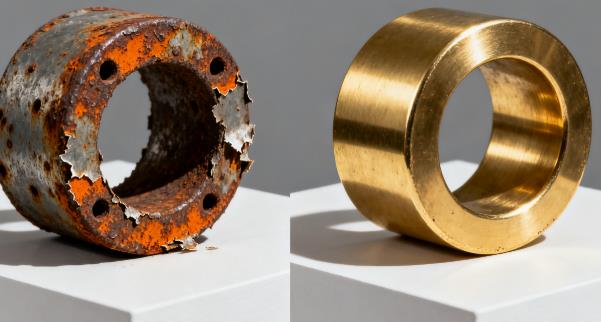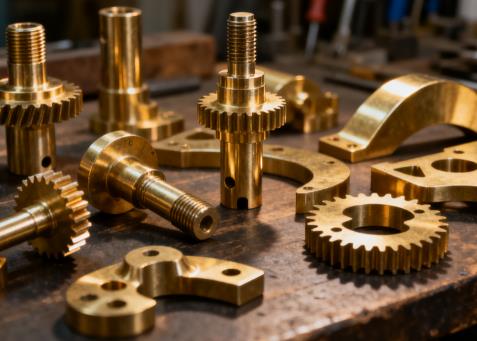In the world of precision manufacturing, material selection is paramount. For engineers, product designers, and procurement specialists, brass stands out as a remarkably versatile and reliable material for CNC machined components. Its unique combination of properties makes it an superior choice for a wide array of applications, from intricate electrical connectors to robust marine fittings.
This article delves into the five core technical advantages that make brass an exceptional material for CNC machining, explaining why it might be the optimal choice for your next project.
1. Superior Machinability: Enhancing Efficiency and Precision
What is Machinability? Machinability refers to the ease with which a material can be cut, shaped, and finished with machine tools to achieve the desired form and dimensional accuracy. It directly impacts production speed, tool wear, and surface finish quality.
Why Brass Excels: Brass, particularly alloys like C36000 (Free-Cutting Brass), boasts arguably the highest machinability of any metal. It is awarded a 100% machinability rating, which is used as the benchmark against which all other metals are measured. This translates to several concrete benefits:
- High-Speed Machining: Brass parts can be machined at significantly higher speeds than steel, aluminum, or stainless steel. This reduces cycle times, increases throughput, and lowers per-part costs.
- Reduced Tool Wear: The alloy's chip-breaking properties and relatively soft nature mean cutting tools experience minimal wear and maintain their sharpness longer. This decreases downtime for tool changes and reduces long-term tooling costs.
- Excellent Surface Finish: Brass produces a clean, burr-free cut. It often requires little to no secondary finishing operations, achieving smooth surfaces and tight tolerances directly off the machine.
2. Exceptional Corrosion and Chemical Resistance
Components operating in harsh environments demand materials that can withstand degradation. Brass offers excellent resistance to a variety of corrosive elements.
- Atmospheric Corrosion: Brass naturally forms a protective patina or oxide layer that shields it from the effects of moisture, oxygen, and pollutants in the air. This makes it ideal for outdoor applications, marine hardware, and plumbing fittings.
- Galvanic Corrosion: While careful design is needed, brass performs well when paired with other common materials like copper and bronze.
- Chemical Resistance: Brass demonstrates good resistance to many chemicals, including salts, acids, and alkalis, further broadening its application scope in chemical processing and industrial equipment.
This inherent resistance ensures longevity and reliability, reducing maintenance needs and preventing premature part failure.

3. High Electrical and Thermal Conductivity
For any application involving the transfer of electricity or heat, conductivity is a critical design factor.
- Electrical Conductivity: Brass is an excellent conductor of electricity. While not as conductive as pure copper, its superior strength and machinability make it the material of choice for a vast range of electrical components. This includes terminal blocks, connectors, sockets, and fuse bodies where efficient current flow is essential.
- Thermal Conductivity: Its high thermal conductivity allows brass components to efficiently dissipate heat. This property is crucial in heat exchangers, radiator cores, and various electronic housings where managing thermal loads is necessary to protect sensitive components and ensure system stability.
4. Natural Antimicrobial Properties
A particularly valuable and often overlooked advantage of brass is its inherent antimicrobial efficacy. Studies have shown that brass surfaces, specifically copper-bearing alloys, have an oligodynamic effect.
This means the ions released from the brass surface are toxic to a wide range of microorganisms, including bacteria, viruses, and fungi. These ions disrupt their cellular processes, effectively eliminating them within minutes to hours of contact. This makes brass an excellent material choice for applications where hygiene is critical:
- Medical devices and equipment handles
- Door handles and push plates in high-traffic public buildings
- Food processing machinery components
- Sanitary plumbing fittings
5. Strength, Durability, and Aesthetic Appeal
Brass strikes an ideal balance between mechanical performance and visual elegance.
- Strength and Wear Resistance: Brass alloys offer a excellent combination of strength, hardness, and ductility. It is resistant to sparking upon impact, making it a safe choice in volatile environments (e.g., around flammable gases). It also maintains its integrity across a wide temperature range.
- Non-Magnetic: This property is essential for applications in electronics, medical devices (e.g., MRI machines), and scientific instruments where magnetic interference must be avoided.
- Aesthetic Quality: Beyond pure function, brass has a distinctive, warm gold-like appearance that is often associated with quality and craftsmanship. It can be easily polished, plated, or coated to achieve a specific aesthetic, making it popular for consumer products, architectural details, and decorative components.

Is Brass the Right Choice for Your Project?
Brass is not just another metal; it is a high-performance engineering material that offers a unique synergy of benefits. Its unparalleled machinability reduces production time and cost, while its corrosion resistance and durability ensure part longevity. Its excellent conductivity makes it a staple in electrical and thermal applications, and its natural antimicrobial properties add a critical layer of functionality for hygienic environments.
When your design requirements call for a material that is easy to machine, reliable in service, and offers additional functional benefits, brass should be at the top of your list. For your next CNC machining project, consider the distinct advantages that brass components can provide in performance, efficiency, and value.
Ready to leverage the advantages of brass for your precision components? Consult with a experienced CNC machining partner to discuss how brass can optimize your specific application.



